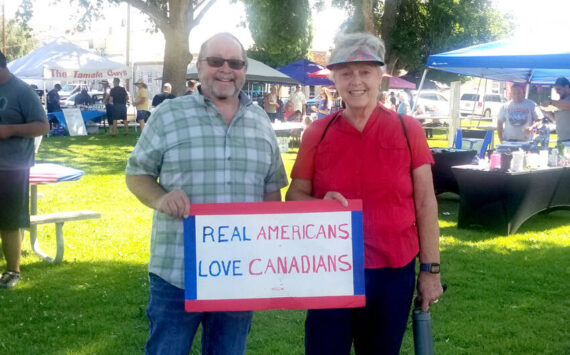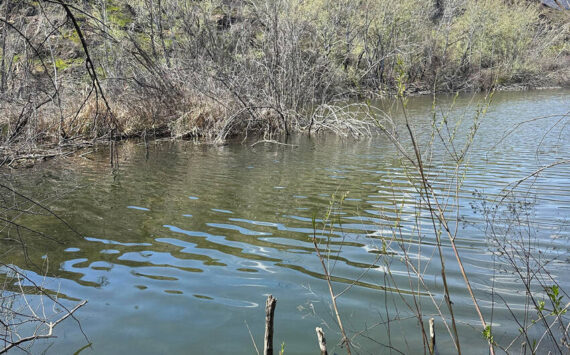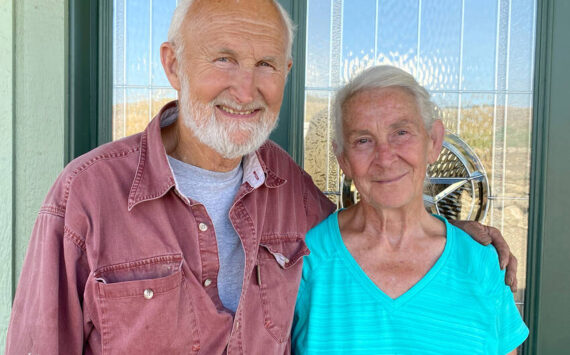TSD’s Stangland arranges wide-ranging round-table
TONASKET – A panoply of elected officials and representatives of a number of other government agencies gathered for an informal “round table” discussion in Tonasket School District board room on Monday, Dec. 16. Called together at the behest of Tonasket School Board member Catherine Stangland, the officials to discuss the concerns that their various entities deal with and ways to communicate with representatives in Olympia and Washington, D.C.
Participants included State Representative Joel Kretz; newly-elected State Senator Brian Dansel; Okanogan County Commissioner Jim DeTro; Tonasket Mayor Patrick Plumb; Tonasket Schools Superintendent Paul Turner; USFS Tonasket District Ranger Dale Olson; three members of the Tonasket City Council; the North Valley District Board of Commissioners; the Tonasket School Board; and elected representatives from three area fire district boards.
While a portion of the gathering was devoted to a presentation on the Tonasket School District’s twin ballot proposals – one for the renewal of the expiring maintenance and operations levy, another for a new bond proposal (also replacing an expiring debt) for expanding and enhancing the district’s facilities – the bulk of the discussion revolved around larger and, in many instances, common areas the different officials face.
“What happens in each of our areas affects all of us,” Stangland said. “If we’re going to be strong in our own area, we need a strong community.”
In addition to the ideal increasing communication and cooperation, the discussion centered around the need for strong schools and health care as a key to health communities, as well as the need to take care of infrastructure needs before the needs become emergent.
“I spent many hours and many miles around the county trying to recruit doctors in the last 30 years,” said Stangland, whose husband is a local physician. “I’m really aware of how impactful what we do is on how it affects the other.
“When doctors come and look at Tonasket, they want to know what the schools are like, obviously. Do we have a good library” What kind of services do we have here? When teachers are looking what they want to know are: what kind of medical services do you have? You don’t get any of those without the county providing good roads to get students to school, or for or emergency services.”
NVH Board Chairperson Helen Casey said her experience had been similar.
“The first thing people ask about is was schools and health care,” she said. “We are really, really blessed to have what we have. But we have to work together to maintain that.”
Between discussing the need for the levy and bond, and the challenges the health care community is facing with funding for a variety of reasons local, statewide and federal, representatives from just about every entity shared their own issues with budgeting and finances.
“Our biggest struggle right now is how to manage responsible city infrastructure on shrinking budgets and less revenue,” said Tonasket City Council Member Jill Vugteveen. “That’s our biggest struggle for the city. We also have facilities that are in need of repair. The city pool is a hot topic… We’ve looked at raising taxes. We struggle with that because everybody else is also asking for money. We feel in the last 5-6 years we’ve tried to incorporate into our decision-making as we’ve considered asking the city taxes for more money. We’ve often put that off because everyone else was raising their taxes, and now we’re to the point where we can’t do that any more.”
Vugteveen’s counterpart Scott Olson agreed.
“The idea was for awhile if it’s not broke, don’t fix it,” he said. “But it’s so much cheaper to fix it before it’s broke rather than have to go out in the middle of the night and dig up a pipe and only take care of the problem, when that same amount of money we could have redone the whole street… To me that’s our job as elected officials, to figure out the true cost, and who should pay that. And that’s hard; people don’t like that, and you have to be honest with them.”
“One thing that scares me … infrastructure wise, is that a lot of infrastructure (in different towns) was built about the same time,” Kretz said. “You look at the Omak sewer system that blew up a few years ago. It was half again past its lifespan…
“I’m worried we’re going to have increased need on that sort of thing the next 5-10 years. A lot of towns are going to be asking for money at the same time we’ve shrunk the public works trust fund.”
Kretz, Dansel and Detro each said that one of the challenges facing the region was a diminishing tax base, and said that state and federal agencies’ actions were a major contributor.
“In the last 10 years, (Washington Department of Fish and Wildlife) acquisition in the county has been about $300 million,” DeTro said. “And by some stroke of genius, they pay PILT – Payment In Lieu of property Taxes. So, for the last two years we’ve billed them $523,000k, and they’ve paid us $151,000. And there is nothing we can do about it.
“If they were on the same tax structure as you, everyone in this room that owns property, and they didn’t pay their taxes for three years, we’d be selling their property on the courthouse steps.”
Dansel said diminished timber harvests and closed mining operations have gutted the Ferry County economy, where he is also a county commissioner.
“In 1981, Ferry County received $1.5 million from timber sales, and schools received quite a bit of that,” he said. “(DeTro) was talking about PILT – we get that too from the federal government. Our PILT for this year was about $600,000. So we have a $900,000 subtraction there, and we’re talking about 1981.”
“In 1990 Republic was one of the higher income areas in the state,” Kretz said. “They had quite a bit of wealth there. They weren’t wondering how to fund schools. They had three shifts at the mill and two mines. Now we have one mine they hope will stay open and are barely harvesting any timber.”
And on the subject of mines, all were concerned about the potential of Kinross Gold leaving the area if it is unable to get through the permitting process for further exploration.
“If we lose Kinross, the impact to the Oroville School District will be $1.4 million,” DeTro said. “It’s scheduled to shut down in June, 2015. The rangers are meeting with the county commissioners once a month now. Everybody’s putting the big push on to try to expedite the permitting process so we can go forward with this.
“If Kinross leaves Ferry County entirely, Brian can verify this, they’ll go broke. It’s hand-written on the wall. And it just so happens …Okanogan County gets to take over Ferry County. It’s not a pretty picture – the dominoes start to fall.”
“When we’re talking about working together we come together and support the schools,” Dansel said. “If you have good schools, you give folks a greater opportunity to not be on the dole. They’ll probably be able to afford homes, live a healthier lifestyle. It’s all backed by statistics, so let’s not ignore that.
“At the same time let’s help folks be able to make a living through increased timber harvest, and give Kinross the ability to give a hole the size of this water bottle in less than 10-15 years.”
A number of those present talked about the need to make sure that legislators were both aware and comprehending Okanogan County and the surrounding area’s needs.
“I want to emphasize the importance of advocacy,” said outgoing NVH Commissioner Lael Duncan. “To provide Joel and the representatives with information for when they attend various committee, to turn the light on. This is not just a remote area where no one lives. It’s an area where folks from the west side come and play. There are actual people who live here, who are important. There are needs here that are just as critical as other places.”
Kretz agreed with Duncan that direct advocacy to legislators in Olympia is critical.
“We need your help,” he said. “We need you to come to Olympia and tell us. Typically when education people come over there it’s to ask for money. But the effective things have been grassroots efforts where a whole community could come and say, hey we’re just not making it. Anybody in this room could come over so they are not just hearing it from me or Brian Dansel.”
“I think it is time to make the point that rural Washington is hurting,” Kretz said. “It’s not just this area, but all over. We’re not getting very good treatment because you can get elected (in a statewide election) (from the area viewed) from the Space Needle.”
One of the regional issues about which there has been some disagreement has been the proposed extension of a heavy haul corridor from Oroville to Pateros, which would run through downtown Tonasket.
Kretz and DeTro favor the move, while Tonasket Mayor Patrick Plumb said he was concerned at the lack of communication with the city over the possibility as well potential issues with underlying infrastructure.
“That would help just about every industry up and down this valley,” Kretz said.
“The entire project from the border to Pateros isn’t going to cost $5 million,” DeTro said. “It’s not going to cost a tenth of that. So my point is, we’re trying to do constructive things that don’t cost the taxpayers a lot of money that will still impact the economy.”
“A lot of our infrastructure is under there and we don’t ahve a great plan to make sure it’s OK underneath,” Plumb said. “And there’s also some things already in place for a project, that chip seal overlay. The heavier traffic you get on there without fixing the infrastructure, I have some big concerns about that.”
Plumb added that some of the solution to the city’s fiscal issues was encouraging local professionals to do as much of their shopping as possible in Tonasket, which is highly dependent on sales tax revenue.
“We are the hub of the things you don’t see,” Plumb said. “All of you major employers and Fire District 4 get your water from somewhere. And when you flush it goes somewhere else. As big businesses we are dependent on the city staying viable and being able to service those needs…
“We are totally dependent on your guys’ employees who are making professional wages, to make sure your license plate says OK Chevrolet. That your grocery bag says Beyers or Grant’s. To make sure your gas is from the Junction, Exxon or the card lock station. There is a point where, man, it’s important to shop local … Other cities in the county have seen an economic upturn. Regretfully we have not.”
The common cord throughout the wide-ranging discussion had been the need to work together to find solutions to the issues, in spite of – or because of – the different perspectives of the elected officials and their constituents.
“I’m just going to be bold and say that I disagree with a lot of you,” Scott Olson said. “But that’s one thing that I like about living here as opposed to my brother on the west side … Everyone has different ideas, but we still talk together and get together.
“I hope we continue to meet and that this is just the start of the conversation, so we can talk about how we see things differently and how we can work together. Because that’s the only way we can make it work.”




